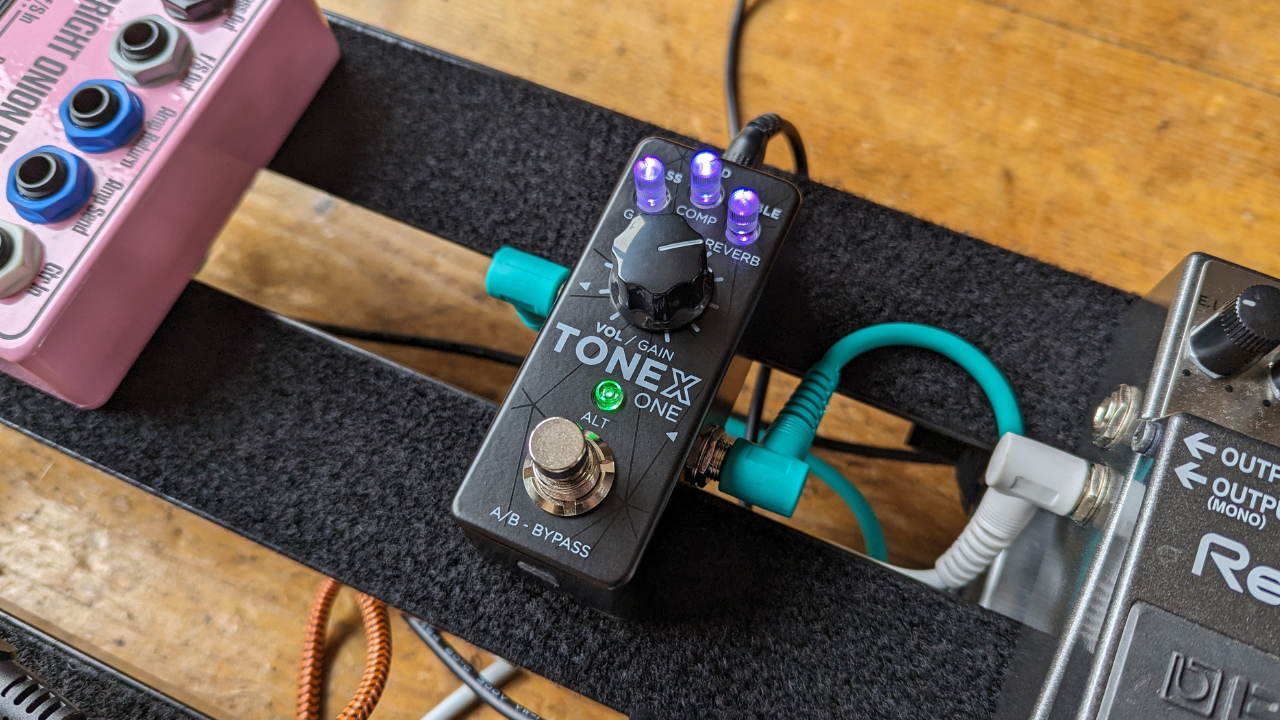MusicRadar Verdict
Providing massive amp tones in a tiny pedal enclosure, Tonex One succeeds on every level in providing accurate amp sound in a housing that will fit on the busiest pedalboards.
Pros
- +
Incredible range of amp tones
- +
Super compact size fits anywhere
- +
Easy-to-use software with 200+ amp models
Cons
- -
Lots of button presses to remember
MusicRadar's got your back
Price: $179.99
Type: Amp modelling mini pedal
Amp models: 200+
Connectivity: TS in, TRS out, USB-C
Weight: 160g
Pre-order at IK Multimedia
We’re at a point in time where the marvels of amp modelling technology have gotten so good you can squeeze not just the sound of one ultra-realistic amplifier into a mini-pedal enclosure, but twenty of them. That’s the promise of the all-new IK Multimedia Tonex One, which condenses a huge selection of history’s greatest guitar amps into a little black box that fits quite literally in the palm of your hand.
Announced by IK Multimedia earlier today, Tonex One can handle dual duties as an amplifier or as a single overdrive, distortion, or fuzz pedal depending on your needs. On the surface, it seems to be a similar pedal to the recently unveiled HX One but looks to continue the precedent set by the Tonex Pedal in handling amp or drive pedal duties only.
I got my hands on the final version of the pedal alongside the pre-release Tonex software to put it to the test ahead of launch, running it through its paces on my pedalboard and as part of my home recording setup.
IK Multimedia Tonex One review: Features

Tonex One comes in a mini-pedal format so as you’d expect, it’s absolutely tiny. Pulling it out of the regular stompbox-sized box I was immediately impressed with its slight stature. Measuring less than 4 inches in height and weighing just 160g, I’d wager it’ll fit on pretty much any pedalboard or desktop, no matter how much gear you’ve got.
The front panel is dominated by a large volume/gain knob and above it sit three micro knobs for controlling bass/gate, mid/comp, and treble/reverb. Below that you’ve got an alt button - which I initially just presumed was an LED for determining the bypass state - whilst a regular pedal footswitch completes the all-matte-black front panel with its spindle-like gloss stripes.
It features a single input and TRS stereo output both with 1/4-inch connections, staggered on each side of the pedal to keep things small. Power is delivered by a regular 9v pedal power and on the bottom is a USB-C port which is also able to power the pedal when plugged into your computer, protected by a small rubber stopper. On the reverse is a rubber pad which you’ll want to take off to velcro it to a pedalboard and that completes this pedal’s simple appearance. There are a lot more features lying under the hood though.
IK Multimedia Tonex One review: Usability
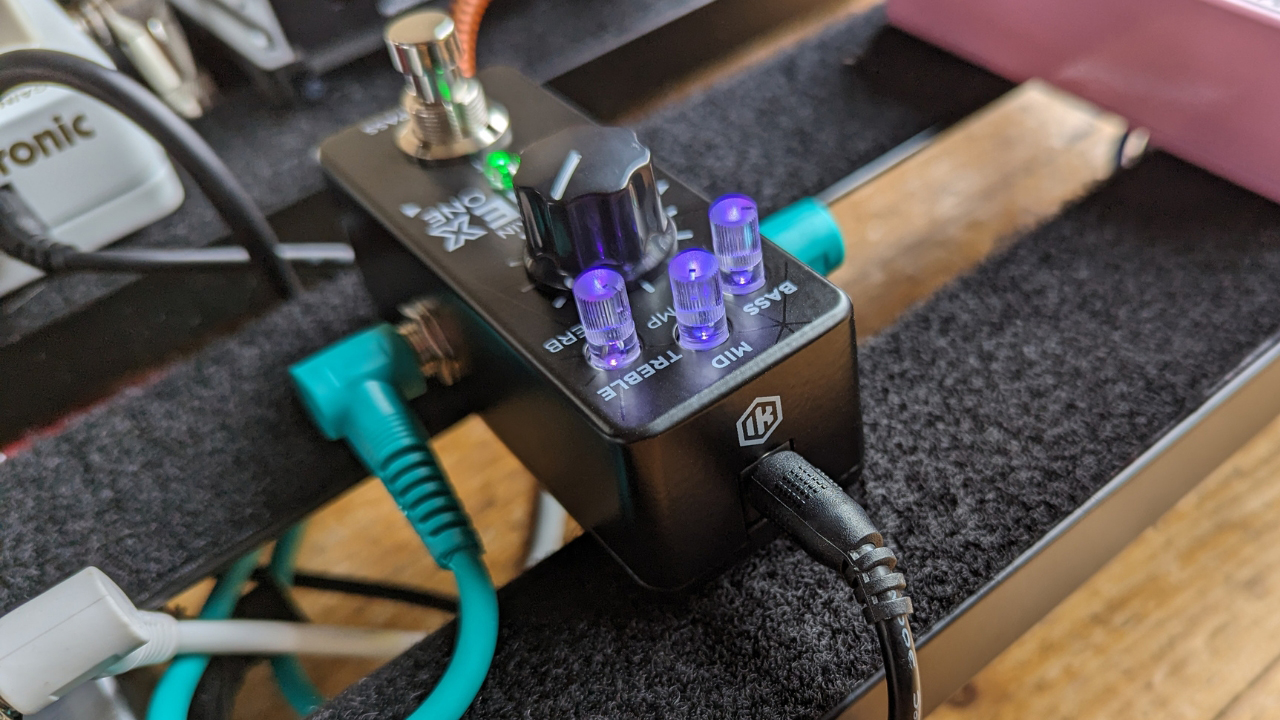
I began my testing by hooking it up to the end of my pedalboard, replacing my HX Stomp in the signal chain. Whilst I waited for the software to download I explored the options alongside the quick start guide. There are two main modes the pedal operates in, dual and stomp. Dual gives you two amp tones to play with, switched A/B style via the footswitch. Stomp mode meanwhile changes the pedal’s behaviour to that of a regular stompbox, with the footswitch turning the effect on and off.
In dual mode the illuminated micro knobs let you know which amp model you’re on, changing colour as you switch between the two. You can also customize these to your preference within the Tonex software. To change to stomp mode you need to hold the alt button for 6 seconds, which leaves the bass and mid knobs illuminated. Setting the bass fully counterclockwise puts you in dual mode, while the opposite move gives you stomp mode. It’s also how you access the global cab settings too, where the mid knob allows you to bypass the cab if you wish.
To access the alternative knob settings you single press the alt switch, which leaves all of the lights on the pedal slowly pulsing to let you know what mode it's in. There’s a basic tuner which uses the illuminated knobs to show your tuning, accessed by holding the footswitch down. It’s pretty limited in its usefulness with only three lights to determine where your note is, and annoyingly a hold-down still changes your amp tone so you can’t use it as a general bypass, but I guess it’s nice to have in a pinch.

In total, you can access twenty amp and stomp models within the pedal, although this is easier said than done. To access browsing mode you need to press the footswitch and the alt button down, which results in each of the micro knobs changing to a different colour. You can then cycle through the presets by turning each micro knob, with bass corresponding to amp preset A, mid to amp preset B, and treble changing which stompbox you want for stomp mode. As you turn the knobs, each will changes colour dependent on which model is set. You then press the alt button and footswitch again to return to playing.
Sound a little convoluted? Yeah, me too. If I’m being honest I don’t think the pedal is very usable this way, like the tuner it’s nice to have the option but I can’t see anyone actually going through the palaver of so many button presses and knob tweaks. I get the intention is to provide extra functionality but it's all just a bit too fiddly for my taste.
The micro knobs are very sensitive due to their small size, and it’s hard to determine how far along the presets you’ve moved as the colour changes happen very rapidly and aren’t always clear. You'd also have to memorize what's in each of the twenty preset slots too. Instead, I’d wager most people will find it easier to use the software and select their two favourite amp tones to utilize Tonex One as a mini 2-channel amplifier instead.
IK Multimedia Tonex One: Sound
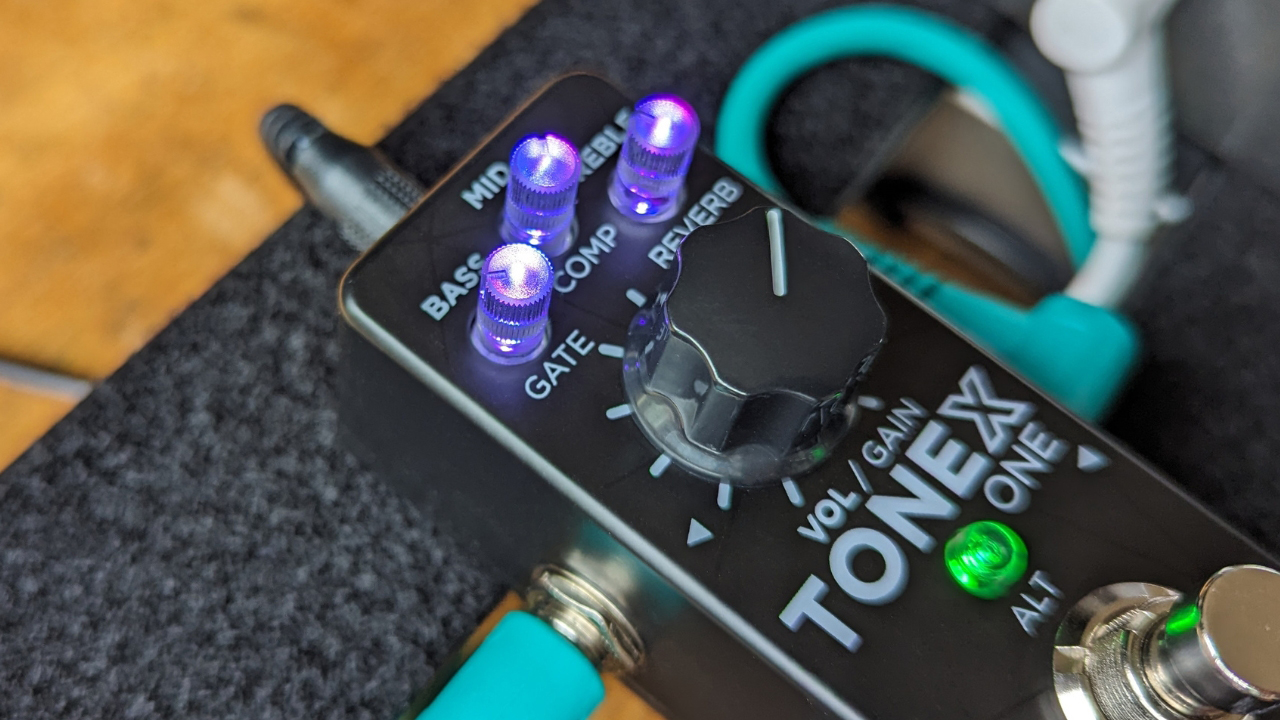
With the software installed and Tonex One hooked up to my PC, I began testing some amp models and found myself quickly blown away by the quality. With this being my first time using Tonex, I found the models to be easily up there with the likes of Helix and Neural DSP in terms of realism, and there's a fantastic selection on offer too.
I started with a classic JCM800 and found that bright and tight tone immediately present, with plenty of sizzle. I was stuck for a good half hour on the Mesa Boogie Maverick tone, finding it eminently playable, thick, and crunchy with bags of fullness. I’ve not played one in real life but I certainly want to now. I love that the amp models all sound fantastic off the bat too, you don't have to endlessly menu dive to tweak them to perfection, they just work.
The amp models interacted really nicely with my drive, distortion, and fuzz pedals on my ‘board too, allowing me to create everything from a nice push to the amp all the way to fuzzed-out mayhem. Of course, some tweaking was needed to get things sitting nicely, but I could certainly see myself using it as a direct option at a rehearsal or live show. Plus that miniscule size means the added benefit of more room for pedals!
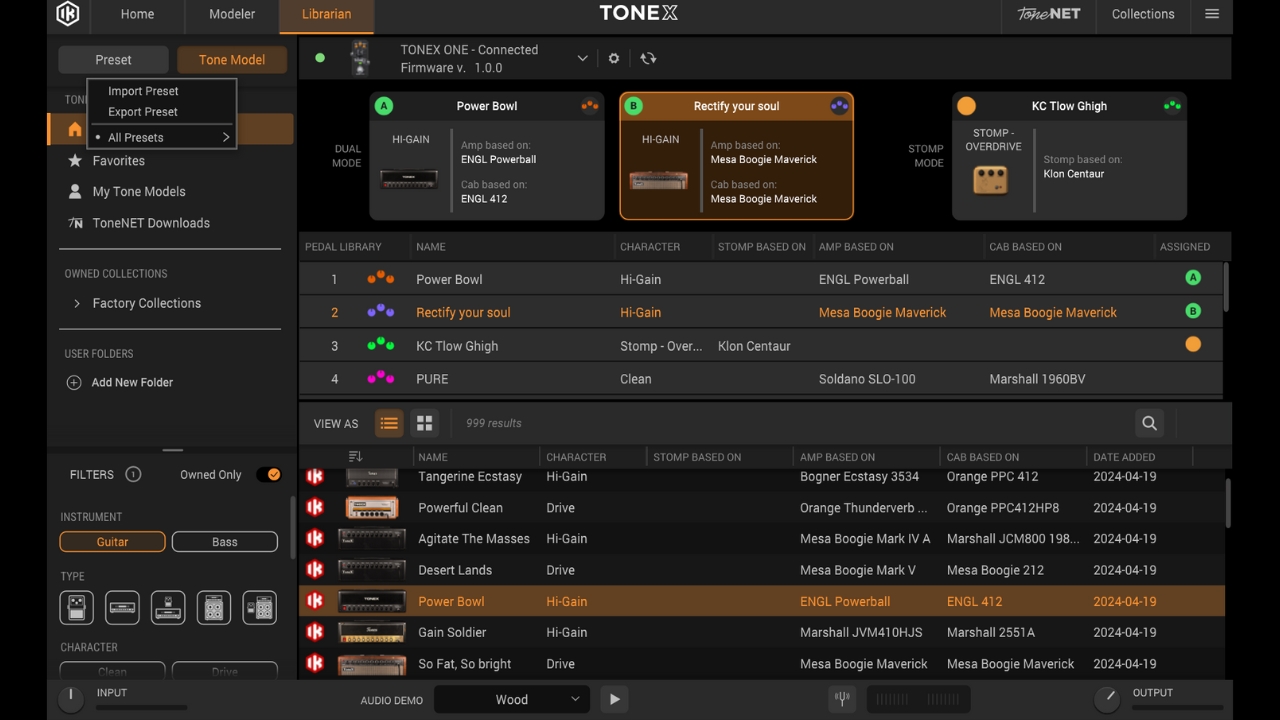
There are over two hundred premium amp models on offer, as well as over 20,000 user-created patches to pick from and it’s truly remarkable having this much choice for a mini-pedal. Browsing in the software is a breeze thanks to the filter system allowing you to slim down the selection to exactly what you’re looking for, whether that’s a clean pedal platform or a high-gain metal monster.
To load models onto Tonex One you simply drag and drop the amp model into the slot and the change is pretty much instantaneous. I’m not sure if it’s a limitation of the pre-release software I had, but I didn’t seem able to tweak or audition the tones within the software, instead having to load them onto the pedal and then change the EQ and other settings with the actual knobs on the pedal. I didn’t mind this way of doing things but could see it getting a little irritating when cycling through hundreds of presets.
While the emphasis is on amps and gain stages, there are some select, utilitarian effects with the single knob gate and compressors handling their duties impressively. The gate is especially good, allowing you to get those super tight djent breakdown chugs without any annoying string-muting noises escaping its clamp. I loved the reverb too, which works as room ambience going from subtle to space to microphone halfway across the room kind of vibes.
IK Multimedia Tonex One review: Verdict
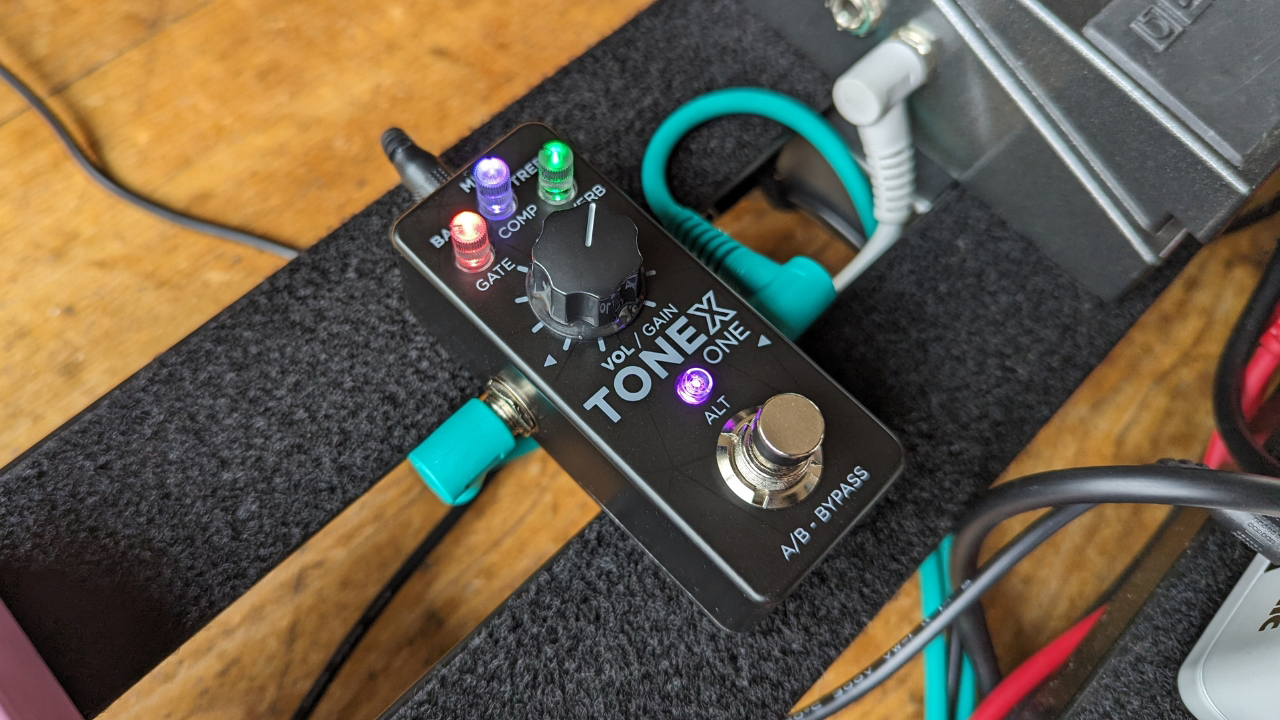
Packing two amp models into an unbelievably small enclosure is an impressive feat and the IK Multimedia Tonex One is a brilliant option if you need quality ‘board-mounted amp tones that don’t take up too much space. Despite the fiddly controls when used with the software Tonex One can easily replace your regular amp or amp modeller if you want to make more room for pedals.
The amp models are stellar quality, as good as anything else out there on the ever-growing amp modelling market, and although there are some limitations if you prefer to utilize your amp’s FX loop, for simpler setups Tonex One is undeniably great quality and value for money.
IK Multimedia Tonex One review: Specs
- Price: $179.99
- Type: Amp modelling pedal
- Connectivity: 1x 1/4-inch input, 1x 1/4-inch TRS output, USB-C
- Power: 9V
- Weight: 160g
- Contact: IK Multimedia

Matt is a Junior Deals Writer here at MusicRadar. He regularly tests and reviews music gear with a focus on audio interfaces, studio headphones, studio monitors, and pretty much anything else home recording-related. Matt worked in music retail for 5 years at Dawsons Music and Northwest Guitars and has written for various music sites including Guitar World, Guitar Player, Guitar.com, Ultimate Guitar, and Thomann’s t.blog. A regularly gigging guitarist with over 20 years of experience playing live and producing bands, he's currently studying Sound Engineering and Music Production at Spirit Studios in the UK.
Baby Audio's Smooth Operator spectral balancing plugin goes pro
"It was ugly, like watching a divorce between four people. After a while, I had to get out": Beatles engineer Geoff Emerick on the recording of Abbey Road, track-by-track
"I said, “What’s that?” and they said, “It’s what Quincy Jones and Bruce Swedien use on all the Michael Jackson records": Steve Levine reminisces on 50 years in the industry and where it’s heading next
